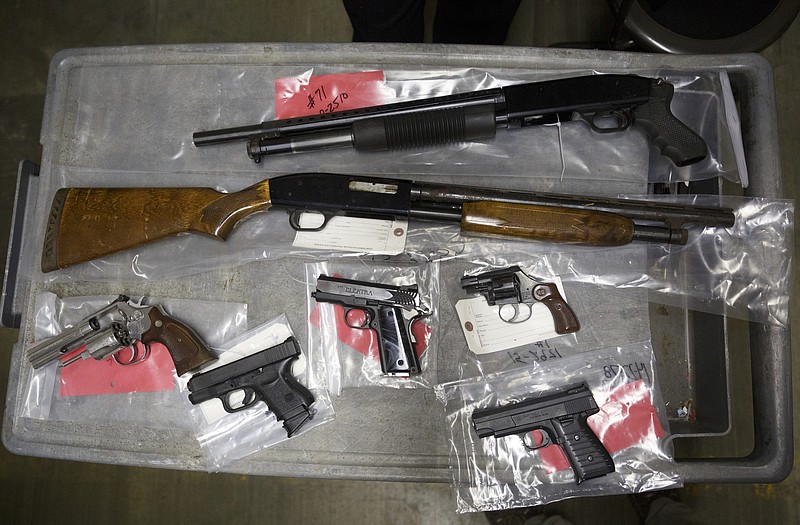Law enforcement agencies across the United States picked up almost 9,000 guns during 2015 that traced back to original owners in Tennessee, according to the U.S. Bureau of Alcohol, Tobacco, Firearms and Explosives.
Most of the 8,841 guns were seized after they were used in crimes, while some of the weapons may have been found or turned in to law enforcement agencies voluntarily.
The guns were recovered from 49 states, and the states closest to Tennessee saw the most guns from Tennessee, according to a new report from ATF. Mississippi topped the list with 392 guns, followed by Georgia with 256.
On average, it took 10.5 years for a gun to go from its first owner to being used in a crime and recovered by law enforcement, according to the report.
That "time to crime" statistic helps ATF agents recognize when someone is purchasing weapons and intentionally selling them to be used in crimes, said special agent Michael Knight. A quick turnaround is suspicious, he said.
"If somebody is purchasing firearms from the same person and within three months they are showing up in crimes, that is a strong indicator that [the seller] is actually part of the criminal element," he said.
On the other hand, if a weapon floats around for several years before it is used in a crime, it's more likely the original owner is not involved, he added.
Just 337 weapons were recovered by law enforcement within three months of their initial, legal purchase from a federal firearms dealer, according to ATF. Another 1,560 guns were recovered within three years, while 3,597 were recovered after three or more years.
ATF only traces guns when a local law enforcement agency asks for a trace, Knight added, so it's likely many more guns were recovered that were not traced.
Agencies have different standards for when to ask for a trace. Chattanooga police trace the majority of the guns they seize, said Sgt. Jason Lewis. The police department traced 902 weapons during 2015, according to ATF. Police are on pace to seize about 1,000 illegal guns this year, Lewis said.
By law, only federal firearms licensees are required to keep records of their gun sales. Private citizens can sell a gun without recording any information about the buyer. Often, Lewis said, guns will pass hands several times before they are eventually used in a crime.
"Unless you're the gun, you really don't know just how many hands they have seen," he said.
ATF can only trace the gun back to its original owner, the person who bought the gun from a federal firearms licensee. To track the gun's movements after that sale, either local law enforcement or ATF officers must contact the original owner and ask what happened to the gun, then follow the trail.
Lewis said gun owners who don't want their guns to eventually end up in a criminal's hands can take several steps to safeguard their weapons. It's important, he said, to keep the gun in a safe place, and locked up, to deter theft.
If a gun owner wants to sell a gun, it's safer to sell the weapon to someone you know, rather than a stranger.
"If it is a straight-up stranger who you know nothing about, try to get a valid state ID from them so you can document who you sold your gun to," he said.
Some pawnshops and gun stores are willing to broker deals between two individuals, and some even fill out paperwork for a small fee, he said. Other stores will buy used guns for consignment, he added.
People also can contact police directly and surrender a weapon to the department.
Contact staff writer Shelly Bradbury at 423-757-6525 or sbradbury@timesfreepress.com with tips or story ideas. Follow @ShellyBradbury.
